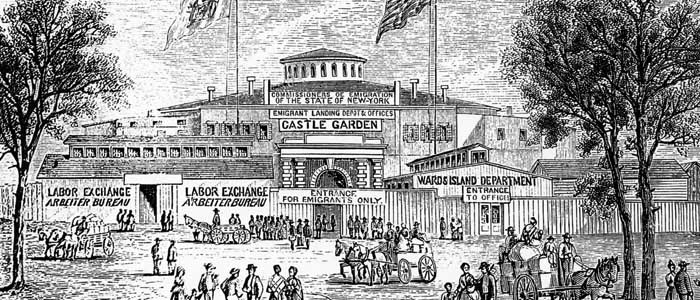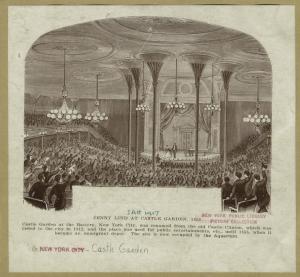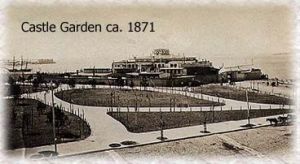
When you think of your ancestors coming to this country, you probably picture them coming through Ellis Island, with the Statue of Liberty in the background. But another building existed before Ellis Island, and 8 million immigrants passed through its doors between 1855 and 1890. This building was known as Castle Garden.

A fort called Southwest Battery was built of Jersey red sandstone at the southwestern tip of Manhattan between 1808 and 1811, and it was finished just in time for the War of 1812. In 1817, after the war, the building was renamed Castle Clinton after Dewitt Clinton, the mayor of New York City at the time. In 1824 its named was changed to Castle Garden and it was re-purposed as an entertainment center, where Jenny Lind, the “Swedish Nightingale,” made her American debut.

At this time, immigrants to the United States came across the Atlantic ocean in sailing ships that brought them primarily to New York City. When the ships arrived they landed along three to four miles of docks along the coast of New York City. The immigrants walked down the gangplank and were on their own. Nefarious businessmen and swindlers took advantage of them in many ways.
Two things happened in 1855 that improved conditions for emigrants coming to America.
The Carriage of Passengers Act of 1855 improved the conditions for emigrants on board ships. The law also required ships, once they had landed, to show a manifest, or list, of its passengers to the local customs officials. (This is the origin of the ships passenger lists that we use in genealogy research today.)
Needing a centralized spot to handle and process people coming in from other countries, the New York Emigration Commissioners signed a 50-year lease for Castle Garden to be used as the single receiving station for the increasing number of immigrants landing on their shore.

Castle Garden opened its doors to the first immigrants on August 3, 1855. The immigrants were checked against the aforementioned passenger list, and then were able to safely exchange their money, find respectable lodging, or buy railroad tickets to continue their journey. They could even look for employment. Of course the system wasn’t perfect, but it was a huge improvement.

In 1876 a fire destroyed most of Castle Garden, but it was quickly rebuilt and put back into service within a few months. Castle Garden continued to welcome an ever-increasing number of immigrants to America, but eventually the number was too great for the building to handle. In addition, responsibility for immigration was eventually taken over by the federal government. April 18, 1890 saw the last immigrants pass through Castle Garden’s doors.

Finding records of early immigrants can be tricky. Remember that the records were kept by the state, not the federal, government, and the information on these early records is sometimes scanty. With luck you will be able to find the name of the ship your immigrant ancestor was on. If your immigrant ancestors came through Castle Garden between 1855 and 1890, you may be able to find their passenger list at Ancestry, FamilySearch, or the LibertyEllisFoundation.
Discover more from Cook Memorial Public Library District
Subscribe to get the latest posts sent to your email.
Categories: Genealogy
Tags: Genealogy
